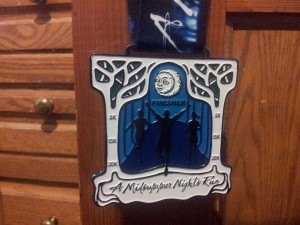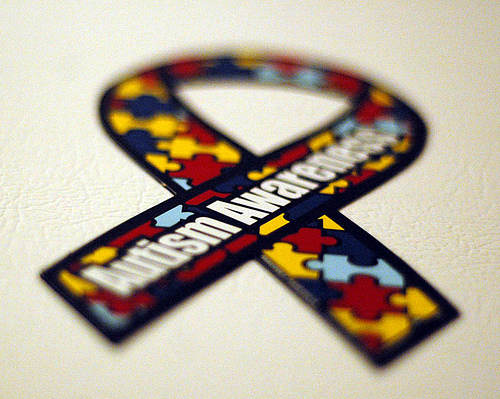I run for many reasons, one of which is to raise funds for autism services. This is to benefit children like my son George, who was diagnosed with autism just over five years ago. But it is also to benefit kids like my younger son James – the siblings, the people who are born into a highly responsible position, regardless of birth order. If there is funding for autism services, everyone benefits, and maybe – just maybe – more resources become available for sibling programs and services.
All of my posts here this week – including this race report – are dedicated to the amazing sibling in my family, my son James.
Anyone on my Facebook friends list will be able to tell you how much I was dreading this weekend’s Midsummer Night’s Run. I was dreading it to the point of wondering if I should even bother to pick up the race kit. I had run two races on this course, including last year’s Midsummer Night’s Run, and I had performed dismally in both of them. This 15K route, which had endless monotonous stretches and virtually no spectator support, seemed to be my personal nemesis.
I signed up for the race thinking it would be my opportunity to set things straight, to defeat this course once and for all. And for a while I was optimistic. I have been having a phenomenal racing season – by far my best since my return to running in 2009.
But as the race drew near, my anxiety levels started to increase. Memories of last year’s Midsummer Night’s Disaster kept plaguing me, I had several rough training runs in a row, and I had some stressful things happening in the non-running areas of my life. Instead of the usual pre-race jitters that I usually get a bit of a kick out of, all I felt was pure dread. A sense of doom.
Chaos at home on the morning of the race did not help my cause. The kids were awake and at war with each other by eight in the morning, resulting in me having to spend much of the day in a peacekeeping kind of role (seriously, when the United Nations needs ambassadors, they should seek out mothers). Before I knew it, it was almost time to leave for the race and I had nothing ready. I didn’t even know where my running clothes were. I scrambled around and dug up clean running clothes and threw them on. I packed a backpack with fuel belt, water, a frantically made peanut butter sandwich, and my race bib (which I remembered at the last minute). I panicked when I couldn’t locate my hat, and ended up leaving without it.
I got to the start area with plenty of time to spare, and I started to relax a little. There was a lady in a booth selling hats, so I bought one and then sat on the grass, letting the pre-race energy work its magic on me. By the time I lined up at the start, I wasn’t exactly feeling optimistic, but the sense of dread was at least lifting.
Let me pause my account for a moment to describe the route. From the start, you run east along a stretch of road for about 2K. Then you turn right onto a path called the Leslie Street Spit and run all the way to the end of a man-made peninsula. You go around a lighthouse and then back to the start.
The stretch along the Leslie Street Spit is very picturesque in places, but it is very desolate, and it feels as if it will never end. If you’re looking for crowd support, you’re not getting it there. No-one lives down there and at night it’s kind of off the beaten path.
When I ran this race last year, I was already exhausted when I turned onto the Leslie Street Spit, a mere 2K into the race. By the time I went around the lighthouse, I was huffing and puffing like the big bad wolf, and wondering how on earth I would make it all the way back to the start.
This time round, I checked off the first 2K with ease. I was aiming to beat 1:40 and had a moment of anxiety when I found myself alongside the 1:45 pace bunny in the second kilometre. I soon left her behind though: I have a feeling the bunny started out too quickly and adjusted her pace accordingly.
At the 3K mark there was an aid station. I chugged a cup of Gatorade and continued on my way. I was watching my pace closely, sticking to 6:30 min/km as well as I could. I resisted the temptation to break away, and instead used the runners around me as pace bunnies.
The kilometres ticked over one by one. I kept waiting for the fatigue of last year to set in, but to my amazement, it just didn’t happen. I breezed my way around the lighthouse and even managed a smile for the photographer lurking in the grass (who looked a bit like Hagar the Horrible minus the horns and the Viking d0g). I coasted along a gravelly section that I distinctly remember wanting to throw up on last year.
Throughout, my pace barely wavered from 6:30 min/km. With about 5K to go, I decided that it would be worth kicking it up a notch. Just one notch, though. I wasn’t ready for an all-out sprint just yet.
When I passed the final aid station, I knew that I was about a minute from turning off the Leslie Street Spit and re-entering civilization. I thoroughly enjoyed the last 2K, smiling and waving at spectators who were kind enough to cheer as I passed.
With 1K to go, I started to hear the noises of the finish line. Now I was ready for all-out sprint, and I had plenty of energy to put into my finishing kick. I rounded the final corner, sprinted down the home stretch and made it over the finish line with energy left in the tank and the clock reading 1:36:25 – an improvement of 13 minutes over last year’s time.
I think I can safely say that I have defeated the monster. My personal nemesis is no more.
(Photo credit: Kirsten Doyle)











